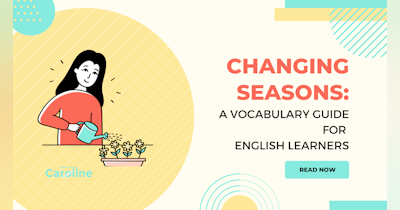Hello my beautiful students!
Embarking on the adventure of learning English? You're in for a treat! English might seem like a maze at first - but guess what? With a sprinkle of determination and the right guide (Teacher Caroline at your service!), you'll be navigating it like a pro.
Let's dive into this fun-filled journey of mastering English together!
1. Set Clear Goals
Before embarking on your English learning journey, it's essential to know your destination. Are you learning English for travel, business, or academic purposes? Or perhaps it's just for personal enrichment? Setting clear goals will help you stay motivated and guide your study plan.
2. Start with the Basics
- Alphabet: Familiarize yourself with the English alphabet. Although it shares many letters with other alphabets, pronunciation and usage can differ.
- Common Phrases: Learn everyday phrases like "Hello," "Thank you," and "How are you?" These will be your foundation for basic communication.
3. Build Your Vocabulary
- Flashcards: Create flashcards with a word on one side and its meaning on the other. Review them daily. Teacher Caroline's Tip: try digital flashcard apps, like Quizlet, so you can always take your learning with you on your smartphone!
- Word of the Day: Introduce a new word into your vocabulary every day. Use it in sentences to reinforce its meaning. Teacher Caroline's Tip: check out Memrise or Duolingo for fresh vocabulary daily.
- Read Regularly: Start with children's books or simple online articles. As your vocabulary grows, progress to more complex materials.
4. Grasp the Grammar
English grammar can be tricky, but it's essential for constructing sentences correctly.
- Tenses: Understand the difference between past, present, and future tenses.
- Sentence Structure: Learn the basic structure of an English sentence: Subject + Verb + Object. Teacher Caroline's Tip: read my blog post about understanding and constructing complex English sentences!
- Practice: Use workbooks or online resources to practice grammar exercises.
5. Engage in Listening Practice
- Watch English Movies or TV Shows: Start with subtitles in your native language, then switch to English subtitles, and eventually try without any.
- Listen to Music: English songs can introduce you to colloquial language and slang.
- Podcasts and Audiobooks: These are great for understanding different accents and improving listening comprehension. Teacher Caroline's Tip: head over to my podcast, English News Pod, to not only listen to the latest news topics in English, but to learn some grammar too!
6. Speak, Speak, Speak!
- Language Exchange: Find an English speaking partner who wants to learn your language and practice speaking with them.
- Join English Clubs: Many cities and universities have clubs or meetups for people learning English.
- Online Platforms: Websites like iTalki or Tandem can connect you with native speakers for practice.
7. Write Regularly
- Keep a Journal: Write about your day or any topic of interest in English.
- Join Online Forums: Engage in discussions on platforms like Reddit or Quora.
- Seek Feedback: Ask native speakers or teachers to correct your writing. Teacher Caroline's Tip: Reddit r/EnglishLearning can also be a great place for getting feedback!
8. Immerse Yourself
- Travel: If possible, visit English-speaking countries. Immersion is one of the most effective ways to learn.
- Change Device Settings: Switch your phone or computer language to English.
- Think in English: Instead of translating from your native language, try to think directly in English.
9. Stay Consistent
Like any skill, consistency is key. Dedicate a specific amount of time each day to studying English, even if it's just 10 minutes.
10. Evaluate and Adjust
Every few months, assess your progress. What areas need more focus? Adjust your study plan accordingly.
Conclusion
Learning English, or any language, is a marathon, not a sprint. It requires patience, dedication, and a lot of practice. But with the right approach and resources, you'll find yourself communicating confidently and effectively in no time. Remember, every expert was once a beginner. Embrace the journey, celebrate small victories, and never stop learning!
Happy practicing!






















